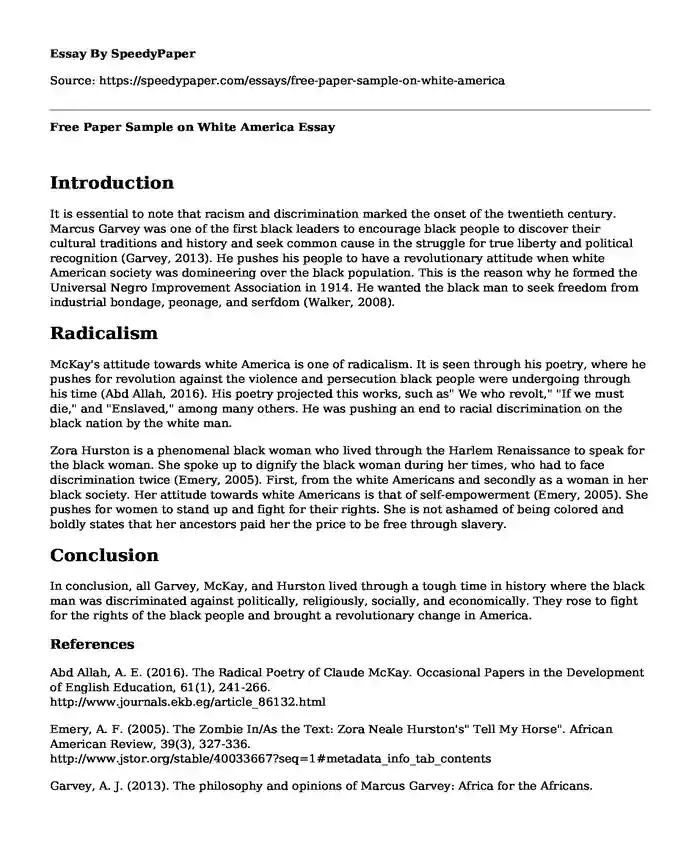
| Type of paper: | Essay |
| Categories: | Racism United States |
| Pages: | 2 |
| Wordcount: | 433 words |
Introduction
It is essential to note that racism and discrimination marked the onset of the twentieth century. Marcus Garvey was one of the first black leaders to encourage black people to discover their cultural traditions and history and seek common cause in the struggle for true liberty and political recognition (Garvey, 2013). He pushes his people to have a revolutionary attitude when white American society was domineering over the black population. This is the reason why he formed the Universal Negro Improvement Association in 1914. He wanted the black man to seek freedom from industrial bondage, peonage, and serfdom (Walker, 2008).
Radicalism
McKay's attitude towards white America is one of radicalism. It is seen through his poetry, where he pushes for revolution against the violence and persecution black people were undergoing through his time (Abd Allah, 2016). His poetry projected this works, such as" We who revolt," "If we must die," and "Enslaved," among many others. He was pushing an end to racial discrimination on the black nation by the white man.
Zora Hurston is a phenomenal black woman who lived through the Harlem Renaissance to speak for the black woman. She spoke up to dignify the black woman during her times, who had to face discrimination twice (Emery, 2005). First, from the white Americans and secondly as a woman in her black society. Her attitude towards white Americans is that of self-empowerment (Emery, 2005). She pushes for women to stand up and fight for their rights. She is not ashamed of being colored and boldly states that her ancestors paid her the price to be free through slavery.
Conclusion
In conclusion, all Garvey, McKay, and Hurston lived through a tough time in history where the black man was discriminated against politically, religiously, socially, and economically. They rose to fight for the rights of the black people and brought a revolutionary change in America.
References
Abd Allah, A. E. (2016). The Radical Poetry of Claude McKay. Occasional Papers in the Development of English Education, 61(1), 241-266.
http://www.journals.ekb.eg/article_86132.html
Emery, A. F. (2005). The Zombie In/As the Text: Zora Neale Hurston's" Tell My Horse". African American Review, 39(3), 327-336.
http://www.jstor.org/stable/40033667?seq=1#metadata_info_tab_contents
Garvey, A. J. (2013). The philosophy and opinions of Marcus Garvey: Africa for the Africans. Routledge. http://www.books.google.co.ke/books/about/The_Philosophy_and_Opinions_of_Marcus_Ga.html?id=65krBgAAQBAJ&redir_esc=y
Walker, A. (2008). Princes Shall Come out of Egypt: A Theological Comparison of Marcus Garvey and Reverend Albert B. Cleage Jr. Journal of Black Studies, 39(2), 194-251.
http://www.journals.sagepub.com/doi/abs/10.1177/0021934708317361.
Cite this page
Free Paper Sample on White America. (2023, Dec 12). Retrieved from https://speedypaper.net/essays/free-paper-sample-on-white-america
Request Removal
If you are the original author of this essay and no longer wish to have it published on the SpeedyPaper website, please click below to request its removal:
- Free Essay Sample about Abortion in the United States
- Free Essay on America and John Adam's Thought of Government
- Child Trafficking Essay Example
- Essay Sample on Eviction of Tenants in Utah
- Essay Example. African American Issues
- Essay on Compulsory Voting in the US: Arguments For and Against
- Ensuring Quality Healthcare: The Evolution and Impact of US Laboratory Regulations - Paper Example
Popular categories




